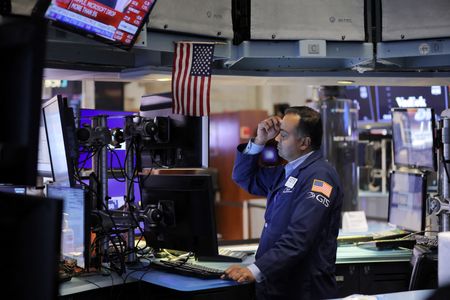By Herbert Lash, Ankika Biswas and Bansari Mayur Kamdar
(Reuters) -The S&P 500 index posted its biggest single-day rally in two years on Tuesday after softer U.S. economic data and Australia’s smaller-than-expected interest rate hike stirred hope for less aggressive tightening by the Federal Reserve.
While labor demand remains fairly strong, U.S. job openings fell by the most in nearly 2-1/2 years in August in a sign the Fed’s mission to tame inflation by hiking rates was working to slow the economy.
Earlier, the Reserve Bank of Australia surprised markets with a smaller-than-expected interest rate hike of 25 basis points. Its cash rate rose to a nine-year peak after six rate hikes in as many months in a tightening cycle other central banks are engaged in as well.
The RBA is the first major central bank to recognize that now is the time to slow down after aggressively raising rates this year, said Anthony Saglimbene, chief market strategist at Ameriprise Financial in Troy, Michigan.
“There’s hope that the Federal Reserve at some point in the fourth quarter will say the same thing. Not stop raising interest rates, but just slow the pace,” he said. “That’s what the market’s kind of rallying on below the surface.”
Still, Fed Governor Philip Jefferson said inflation is the most serious problem facing the U.S. central bank and it “may take some time” to address. San Francisco Fed President Mary Daly said the central bank needs to deliver more rate hikes.
Rate-sensitive tech stocks rose as yields on the benchmark 10-year Treasury fell for a second day in a row after the jobs data and RBA’s surprise move. Valuations on tech and other growth stocks fall when their cost of capital rises. [US/]
It was the biggest one-day gain for the S&P 500 since May 2020. The Dow Jones Industrial Average and S&P 500 posted their biggest two-day rallies since April 2020.
The repercussions of higher rates will likely be reflected in corporate results when earnings season begins in two weeks, said Dennis Dick, founder and market structure analyst at Triple D Trading Inc.
“We’re still in for a tougher time here. I do think this earnings season is going to not be good,” he said. “If one of the big guns warns that could end the rally rather quickly. This is just a relief really as opposed to the start of a new bull market.”
Billionaire Elon Musk proposed going ahead with his original offer of $54.20 to take Twitter Inc private, two sources familiar with the matter said on Tuesday, sending the social media firm’s shares surging 22.24%. Twitter was the largest percentage gainer on the S&P 500.
Tesla shares had been up about 6% before the news and immediately pared gains, ending up 2.90% on the day.
The megacap titans led the rally, with Amazon.com Inc climbing 4.50% and Microsoft Corp advancing 3.38%. Apple Inc rose 2.56% while Google parent Alphabet Inc added 3.04%.
Banks such as Citigroup, Morgan Stanley and Goldman Sachs climbed more than 3%.
The rally was broad based, with just six stocks in the S&P 500 index closing lower.
The Dow Jones Industrial Average rose 825.43 points, or 2.8%, to 30,316.32, the S&P 500 gained 112.5 points, or 3.06%, at 3,790.93 and the Nasdaq Composite added 360.97 points, or 3.34%, at 11,176.41.
Volume on U.S. exchanges was 12.51 billion shares, compared with the 11.63 billion average for a full session over the past 20 trading days
The rebound in stocks on Monday followed the S&P 500’s lowest close in nearly two years last week that capped its worst monthly performance in September since March 2020.
Rivian Automotive Inc jumped 13.8% after the electric-vehicle maker said it produced 7,363 units in the third quarter, 67% more than the preceding quarter, and maintained its full-year target of 25,000.
Advancing issues outnumbered decliners on the NYSE by a 6.80-to-1 ratio; on Nasdaq, a 3.70-to-1 ratio favored advancers.
The S&P 500 posted two new 52-week highs and one new low; the Nasdaq Composite recorded 53 new highs and 73 new lows.
(Reporting by Medha Singh, Ankika Biswas and Bansari Mayur Kamdar in Bengaluru; Editing by Anil D’Silva, Arun Koyyur, Sriraj Kalluvila and Richard Chang)





